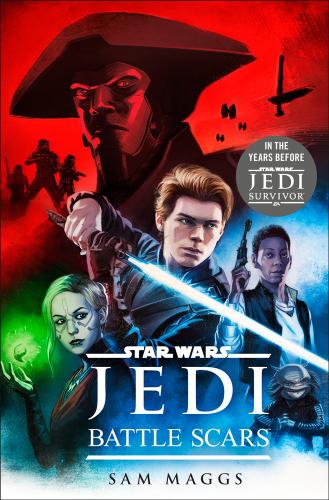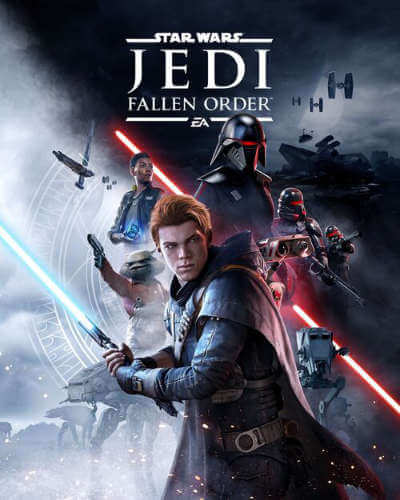Star Wars Jedi: Battle Scars Review
Our full review of Star Wars Jedi: Battle Scars from Sam Maggs!
Mar 7, 2023
Unmitigated fervor struck the Star Wars community after the worldwide release of Jedi: Fallen Order. After years of pining for a Star Wars game that fans and gamers alike could fully appreciate, we were gifted a story full of dense planets, wondrous characters, and a plethora of fun additions to the Star Wars mythology.
In late 2022, the Mantis crew was revealed to be returning to screens once more with Jedi: Survivor, a sequel that would pick up years after the first game’s thrilling conclusion. With so much story left to witness with Cal, Cere, Merrin, Greez, and the consistently adorable BD-1, fans were understandably thrilled with the announcement of another narrative set in their world.
What more could you ask for? Well…how about a full book about them in the meantime?
Star Wars Jedi: Battle Scars, written by debut Star Wars novel author Sam Maggs, reunites us with the Fallen Order found family as they pick up another member who offers a mission, some unexpected romance, and a deeper reflection at why each of them signed on to fight the Empire in the first place.
Plot
Jedi: Battle Scars can best be described as a tale of two books. The “first book” features the crew of the Mantis dealing with the prospect of a new member joining the crew in the form of Fret, a defecting stormtrooper in need of help. Fret’s introduction serves as the major catalyst of the book, and her arrival on the ship affects the entire crew’s outlook of the mission at large, but none moreso than Merrin, the fan-favorite nightsister of Dathomir.
Merrin and Fret’s attraction is nearly instantaneous, and the repercussions of their budding relationship surrounds a majority of the first half of Battle Scars in a way that showcases much needed and celebrated LGBTQ+ representation in the Star Wars galaxy. While highlighting a passionate queer relationship is a welcome addition to the Star Wars Canon, some of their interactions and Fret’s effect on the crew at large do seem to hinder the clarity of purpose and plot. A fascinating and well-written queer relationship and a plot with a clear vision absolutely can and often do exist in the same realm, but this book wasn't quite able to combine the coherency of the relationship dynamics with the main direction of the story. As previously stated, Fret does come with a mission for the team, but the connective tissue needed for the overall narrative to progress is somewhat difficult to decipher amongst Merrin and Fret’s increasingly spicy endeavors.

However, there is a point in Battle Scars where the “second book” begins to emerge as the striking cover star, the Fifth Brother, imposes his will on the crew as their interests become aligned, and almost immediately, the thrilling sense of adventure from Fallen Order takes hold. Not only does this provide fantastically written action scenes (as featured in previously released excerpts), but the complexity and quality of the character interactions rises considerably to a point where the earlier confusion almost seems to melt away entirely.
This dichotomy of tone that these somewhat conflicting portions of the book present is especially curious, and there is a distinct chance that certain readers may not find the discrepancy bothersome in the slightest. Long have there been stories of intense, playful romance and skillful intrigue playfully intertwined, and perhaps the distinct dividing line that appears in Battle Scars for some may not be as pronounced for others.
Nonetheless, while the ending of Battle Scars provides a shock of adrenaline that leads beautifully into the unwavering need to play Jedi: Survivor in order to continue the story, the earlier plot points remain a bit too blurry to provide a consistently engaging adventure that can be placed on a pedestal alongside its predecessor.
Characters
Sam Maggs loves these characters, and that much is clear from the second the book begins. Each of the main squad present in Fallen Order is gifted with chapters from their own point of view, and Maggs clearly takes the time to introduce what made each character so beloved in the game while allowing them to continue their evolution within her own story.
The clearest beneficiaries of this treatment are Merrin and Greez. Merrin’s lack of inclusion in the majority of Fallen Order was a sore spot for many fans, and Maggs rights that ship immediately by focusing intently on her innermost dealings with her latent trauma, her battles over her fear and anger, and an examination of the walls she has built around her heart for years and years. Merrin’s pansexuality is also completely canonized as her thoughts and relations throughout the book present a proudly queer woman discovering all sorts of nuances about her life – a journey seldom seen in Star Wars that will undoubtedly be impactful to readers now and forevermore.
Greez adds a marvelously organic layer of levity to the book without sacrificing the necessity of his commentary and leadership when it comes to the organization and efficiency of the crew. His trademark grit is ever present as he views the galaxy in ways that only he can, and if you weren’t the biggest fan of the Latero pilot by the end of Fallen Order, Maggs’s treatment is sure to bring you around just in time for Survivor.

Conversely, the introduction of Fret as a device to stretch the crew into discoveries of uncomfortable truths that often lay dormant in family environments serves less as a story catalyst than it does as a harbinger of tonal confusion. Throughout Fret’s time on the Mantis, the crew doesn’t appear to be intentionally conflicted so much as the writing of the characters doesn’t seem to match their predefined identities. Dialogue choices, inner monologues, and character interactions surrounding Fret’s presence appear incongruous with what Maggs sets up before and after the character’s arrival which furthers the idea of the two book structure that can be identified within Battle Scars.
However, there is no denying the vibrant intensity with which Maggs writes her villains, and whenever the Dark Side of the Force is explored (namely through Merrin and the Fifth Brother), the vivacious way in which it corrupts the characters is truly delicious. Some of these scenes lead to moments of conflict within their compatriots as they question the necessity of such darkness, but the pages fly by as the clear passion with which Maggs writes these themes reveals itself.
On the whole, the Mantis crew shines its brightest when they are able to explore the dynamics that made them audience favorites within Fallen Order, but when Fret’s introduction alters the familial makeup, the vibrancy and cohesiveness of the character relationships tends to follow.
Originality
One of the wonders of Star Wars literature is its ability to create connective tissue between other stories and characters in the galaxy. Battle Scars carves out a unique place in this respect by bridging the gap between not only two other narratives, but also two different types of media.
We’ve seen books that cross over with video games before with Alexander Freed’s Twilight Company and more directly with Christie Golden’s Inferno Squad. Maggs’s Mantis tale, in contrast, is far more connected to the Jedi series than either of these previous entries due to its place as a direct bridge between the two games.
Aside from its technical creation, the chief element of originality in Battle Scars is found within its exploration of Merrin’s character and the Nightsister mythos. The swirling green magic of Dathomir has long intrigued audiences with sinister appeal, but Maggs digs deeper into Merrin’s character and the history of her people to see just what makes this Dark Side connection so special.
Beyond Merrin’s exploration, the rest of the adventure plays out in a seemingly expected way in terms of Star Wars literature. It’s impossible not to think of the restraints that may have been placed on the story with the acknowledgement that some gamers may skip the book on their way to play Jedi: Survivor. Taking a ton of storytelling risks isn’t exactly a practical solution when your characters also need to be instantly recognizable for those that just played Fallen Order, but whether that played into the ideas behind the book is pure speculation.
Writing
Previous fans of Sam Maggs will know her name from countless bylines over the years. Her career began in the throes of entertainment journalism and grew exponentially as she wrote in almost every medium imaginable, from nonfiction commentary to IP comics to middle grade novels and more.
Jedi: Battle Scars represents her first adult novel, and her unique authorial voice rings true throughout the book. Additionally, the importance of featuring a queer author with a story so enmeshed in the queer experience cannot be understated. Merrin’s identity and understanding of this part of her life is represented with authenticity, compassion, and care in a way that Maggs obviously and deeply values.

However, the earlier parts of the novel do struggle from time to time when it comes to some of the more technical elements like structure and tone. Certain scenes feel inconsistent and rushed in comparison with later parts of the story that are infused with more of the narrative’s main action set pieces. There are undoubtedly powerfully poignant moments littered throughout, but some of their impact is lessened by slightly offbeat humor and dialogue.
Nonetheless, the third act of the book is absolutely thrilling as Maggs sinks into a rhythm that provides increasingly vivid descriptions of action and excitement, as well as a confrontational conversation that ranks among some of the best “family fights” we’ve seen in quite some time. The quality of the ending could be attributed to a number of intangibles from increased authorial comfort to the makeup of the cast to the stakes of the scenes, but the impact of the book’s final pages cannot be denied.
Maggs succeeds in carving out a corner of the Star Wars galaxy that has never been explored before. While the entirety of the product may not land for every reader, there is no doubt that her voice belongs in the fabric of the galaxy of Star Wars for many projects to come.
Entertainment
The best parts of Jedi: Battle Scars feel like you’re playing a video game. When Maggs is firing on all cylinders, you can practically feel the controller in your hands as lightsabers clash or Cal runs down a collapsing hallway, and if the high action set pieces of Fallen Order plastered a smile on your face, the events of this book are likely to do the same.
Early on in the story, the video game aspect shows a bit of its shortcomings as it occasionally feels like you’re witnessing the slower, exposition filled beginning of a game without the actual ability to play it. Luckily, these less invigorating moments fall quickly to the wayside once the thrilling action takes over thanks to the Fifth Brother and his dastardly adversity.
Additionally, a large source of entertainment is derived from the interaction of the main crew as the book nears its climax. So much of Fallen Order’s success was based around how electric the chemistry was between the members of the Mantis, and although it takes a while for them to recapture that magic, when Maggs truly sinks her teeth into their personalities and lets them shine together, the excitement of that first playthrough washes over the novel.
By the end of the book, the reunion with the characters coupled with the explosive momentum of the final act will have every reader setting a countdown until Jedi: Survivor’s release.
Verdict
Jedi: Battle Scars will represent a different experience to many different readers. The beauty of Star Wars literature is its ability to access different tones, ideas, and people throughout a galaxy far, far away in addition to our own.
For some, Battle Scars may present a roller coaster of a reading experience as the “two book” structure takes hold, and for others, they may discover a type of Star Wars book they’ve never seen before that they would very much like to see again and again.
Regardless, it is clear that Sam Maggs set out to write a book about the characters and stories that mean the most to her, and when she succeeds, she does so with passion and grace. When Cal and the crew end this chapter of their adventure, it becomes nearly impossible to wait for Jedi: Survivor’s release day.
Jedi: Battle Scars is available now wherever books are sold and on Audible where it is narrated by Sean Kenin Elias-Reyes. For more with author, Sam Maggs, be sure to check out her interview with The Living Force wherever you get your podcasts!
Eric Eilersen is a Senior Writer at Youtini and co-host of The Youtini Show. He loves collecting Star Wars Funkos, lightsabers, and LEGO as well as playing video games, reading Brandon Sanderson novels, watching the Dallas Cowboys, and spending time with his partner and pets. You can follow him at @EricEilersen.







